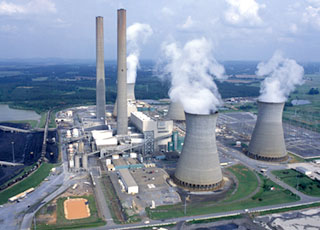ENERGY INDUSTRY REPORT
The 'China Synfuel' Solution
An even larger energy project is brewing to the south: a $5- billion, 1,500- plus- acre (608- hectare)
 |
| Georgia Power's Plant Bowen in Cartersville, Ga., is one of three power plants receiving a cumulative investment of $2 billion in scrubber technology to reduce emissions. |
The planned facility will use lignite from North Louisiana as the primary raw material to produce gasoline, ethanol, synthetic gas, electricity, steam and methanol. The plant is expected to create 900 permanent jobs at the Geismar facility and another 300 jobs in the four- parish mining area of North Louisiana.
"This is an exciting project that will help stabilize feedstock costs for existing petrochemical facilities in the area that have been struggling in recent years with high natural gas prices," Gov. Blanco said in making the announcement on June 15. "The facility, when permitted, will help protect existing jobs within the petrochemical industry and create new and exciting economic growth opportunities in Louisiana."
Construction will begin once all regulatory permits are obtained and will take about four years to complete, but Louisiana officials insist that the plant is a done deal.
"This project is very much a sure thing," Louisiana economic development secretary Michael Olivier tells Site Selection. "The governor has directed streamlining the permitting process. The project has been underwritten totally in China, and they are now ready to acquire land."
While some in the Louisiana media remain skeptical, the project has already secured major financial backing from such Wall Street giants as UBS, JP Morgan Chase and Citigroup. And the biggest player of all – Beijing- based China Petroleum and Chemical Corp. (Sinopec Group) – is the real muscle behind the deal, having secured a $5- billion performance guarantee by the China Development Bank.
The plant will process 20 million tons of lignite each year from Bienville, Desoto, Natchitoches and Red River parishes to produce 100,000 gallons of gasoline per day and byproducts such as liquefied petroleum gas, methanol, ethanol, sulfuric acid and agglomerate, a material used in road construction.
The facility will generate nearly 1,400 megawatts of power, about 95 percent of which will be used by Synfuel to run the plant. The remaining 70 megawatts will be leased to adjoining industries to generate power for their own internal use.
Hexicon Specialty Chemicals and Chemtura Corp. have signed agreements to purchase fuel products made by Synfuel at the plant, and BASF is in negotiations to become a buyer. BASF operates a large complex in Geismar, and Huntsman recently chose the community for a "world- scale" maleic anhydride plant.
Paul Hsin Liu of Westbury, N.Y., founder of Synfuel, said he selected Louisiana over competing sites in New York, Mississippi and Tennessee for its access to lignite; its water transportation network; a water- accessible building site; the interest of existing petrochemical companies near Geismar; and Louisiana's tax incentive programs.
The exact amount of state incentives remains unknown because they still must be negotiated, but Olivier says they could easily amount to the largest package ever offered by the state.
"This will be a big incentives package," he says. "We will use the Quality Jobs program, which pays 6 percent of the workers' salaries as a rebate back to the company, property tax exemptions, sales and use tax exemptions, and we will provide training for the workers at the plant. In total, it will be a very impressive number, probably the largest package in the history of our state."
Olivier says the state has conducted a return- on- investment analysis on the project. The plant is expected to generate more than $3 billion in purchases of goods and services in Louisiana over 10 years and nearly $300 million in state and local taxes.
Synfuel founder Liu, who holds a doctorate in plasma physics, noted that "the processes and technologies we will use are being introduced in Louisiana for the first time."
Olivier adds that Synfuel will only enhance Louisiana's stature as a global competitor in the energy business.
"One- fourth of the nation's supply of oil and natural gas either is produced here or moves through Louisiana," he says. "We have 17 refineries, second only to Texas. Plus, we have been working with liquefied natural gas companies to identify and establish locations in Louisiana for LNG terminals. We have two such plants under construction and six more are planned."
The proposed LNG terminals range in cost from $250 million to $1.5 billion, says Olivier.
"We have established our role as an energy producer for America," he added, "and we are taking it to the next level."

